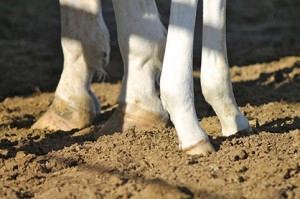Is My Horse Lame or Neurologic?
On Tuesday, March 1, at 6:30 p.m., Dr. Neil Mittelman and Dr. Holly Stewart will present a joint lecture: “Is My Horse Lame or Neurologic?” The presentation is part of the First Tuesday Lecture Series at Penn Vet’s New Bolton Center, 382 West Street Road, Kennett Square, PA.
The series offers free lectures to the public on equine topics on the first Tuesday of selected months. The lectures take place in New Bolton Center’s Alumni Hall. Due to limited seating, reservations are recommended and can be made by contacting Barbara Belt at beltb@vet.upenn.edu.
If you’ve ever noticed that your horse doesn’t feel quite right while riding or working, and you’ve wondered what is going on, you are not alone. It can be challenging to distinguish between a horse that has a mild lameness and one that is affected by neurologic disease.
This lecture, in an interactive format, will review and explain actual cases in which clinicians found it difficult to distinguish between lameness and neurologic disease. The two presenters will discuss their processes in analyzing the patients, and explain some of the most common causes for lameness and neurologic disease in the region.
Dr. Mittelman, a second-year Resident in Internal Medicine, has a special interest in neurologic diseases in horses. Dr. Stewart, a third-year Resident in Surgery, has an interest in the effects of injuries on bones, cartilage, tendons, and ligaments.
Spring Series:
April 5: Dr. Jennifer Linton, “Equine Pregnancy: What to Expect When Your Horse is Expecting”
May 3: New Bolton Center Clinical Team: “All About EQUIMAGINE™, Robotics-Controlled Imaging
June 7: Dr. Barbara Dallap Schaer: “Medical Director Q&A: What’s New at New Bolton?”
About the First Tuesday Lecture Series
The First Tuesday Lectures are presented September through December, and March through June. During the series, faculty and clinicians at New Bolton Center share current information on topics of interest and relevance to horse owners and caregivers throughout the region. Many of the lectures highlight the advanced techniques performed by Penn Vet’s team of leading clinicians and the state-of-the-art equipment and facilities available to ensure the best possible outcomes for patients.
About Penn Vet
The University of Pennsylvania School of Veterinary Medicine (Penn Vet) is a global leader in veterinary education, research, and clinical care. Founded in 1884, Penn Vet is the first veterinary school developed in association with a medical school. The school is a proud member of the One Health initiative, linking human, animal, and environmental health.
Penn Vet serves a diverse population of animals at its two campuses, which include extensive diagnostic and research laboratories. Ryan Hospital in Philadelphia provides care for dogs, cats, and other domestic/companion animals, handling more than 30,000 patient visits a year. New Bolton Center, Penn Vet’s large-animal hospital on nearly 700 acres in rural Kennett Square, PA, cares for horses and livestock/farm animals. The hospital handles more than 4,000 patient visits a year, while the Field Service treats nearly 37,000 patients at local farms. In addition, New Bolton Center’s campus includes a swine center, working dairy, and poultry unit that provide valuable research for the agriculture industry.
For more information, visit www.vet.upenn.edu.











